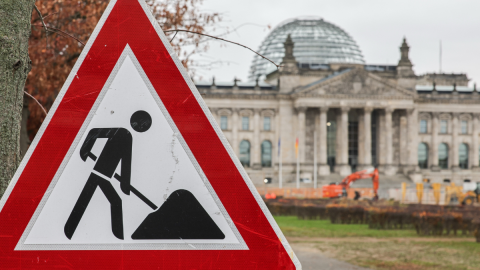A new spirit of optimism has come to Turkey. After the victory of the member of the opposition, Ekrem Imamoglu, in the mayoral election in Istanbul, the hope of an imminent rise of the country from its economic trough has taken hold of Turkey. The stock exchange reacted positively, as did the Turkish lira. Alexandre Dimitrov, fund manager of ESPA STOCK ISTANBUL, explains the chances of Turkey to pull off an economic turnaround.
How do you rate the success of the member of the opposition at the mayoral elections in Istanbul?
It is a positive fact that the incumbent AKP and President Erdogan accept the result. While I would not expect political loosening for the time being, the victory of the opposition in the biggest Turkish city with more than 10 million voters is still a clear signal. At its core, AKP is a party that is supportive to the economy and investors, and its member and leading officials should now urge the government and President Erdogan to return to this set of policies. And Imamoglu (which means “son of an imam”) is actually conservative, his wife wears a headscarf. This scenario is now all about regaining confidence, which will only work step by step.
[post_poll id=”8302″]
But there are certain latent political risks at play, not the least the conflict with the USA because of the intended purchase of the missile defence system S-400 from Russia?
That is without a doubt another risk, with possible US sanctions looming at the horizon. But Turkey is an important NATO partner. The first deliveries are expected for July. As initial sanction, the USA might block the participation of Turkey in the joint production of the US fighter jet F-35 (source: Spiegel online /German)
How is the Turkish economy doing?
The sentiment has picked up from the beginning of the year, as has the trust of senior managers in June (Turkey Real Sector Confidence Index). Capacity utilisation has increased to the highest level since September 2018 (source: Bloomberg). That being said, growth is expected to remain negative in 2019 at -1.5 percent.

Alexandre Dimitrov, Fondsmanager ESPA STOCK ISTANBUL
The balance of trade deficit had fallen by 66% as of April (y/y), whereas exports had increased by 7% and imports were down 14% (source: Bloomberg). Revenues in the service sector increased by 30%. In the tourism sector, we expect a double-digit growth rate for 2019. Due to the significant depreciation of the currency in recent years, the popular holiday destination Turkey has also become more affordable.
The Turkish economy depends on raw material imports. Due to the weak lira, the prices of goods and investments from abroad have been going up. Also, Turkey and its corporate sector have found it increasingly hard to service their debt in dollar. This has now started to slowly change.
“This scenario is now all about regaining confidence, which will only work step by step.”
Alexandre Dimitrov, Fondsmanager ESPA STOCK ISTANBUL
What would the government have to do to support the economic recovery now?
That is not overly difficult. It has to engage in solid financial policies and thus regain investor confidence. It also has to be clear that the central bank acts independently and responsibly. It will take a while for credibility and foreign capital flows to be restored to their former levels. But we also have to bear in mind: Turkey has a population of 80 million people, and they are largely young and like to consume.
How has the stock exchange reacted to the latent political and economic uncertainties in the past years?
At minus 42 percent (in euro) over the past 5Y, the Turkish equity market is still among the worst performers globally. The weak currency complements the picture. Since the beginning of 2018, the Turkish lira has lost 53 percent relative to the US dollar (as of 30 June 2019; source: Bloomberg). The Turkish central bank was clearly too late and hesitant in its reaction. It only raised the key-lending rate when inflation had increased to 24 percent last year.
CHART STOCK EXCHANGE AND CURRENCY 5 Years

Note: Past performance is not indicative of future development.
Is this a good moment to invest in Turkish equities?
It is definitely the best opportunity to buy in five years. At an average PE of 6.8x (in terms of 2019 earnings estimates; source: Bloomberg), the valuations are extremely attractive. Turkish shares are traded at a discount of almost 50 percent to other emerging markets stock exchanges. Only Russia is cheaper. Inflation fell to 18.7 percent at the end of May, and the currency stabilised somewhat in its wake. The industrial sector of Turkey is solid. All exporting sectors are well off.
How is your fund, ESPA STOCK ISTANBUL, positioned?
We currently focus our investments on raw materials companies and export-oriented companies. There are a number of highly interesting companies in Turkey that are excellently managed, e.g. the white goods producer Arçelik or the airport operator TAV Airports. We are cautious with financials, i.e. banks and real estate companies.

Legal note:
Prognoses are no reliable indicator for future performance.
Legal disclaimer
This document is an advertisement. Unless indicated otherwise, source: Erste Asset Management GmbH. The language of communication of the sales offices is German and the languages of communication of the Management Company also include English.
The prospectus for UCITS funds (including any amendments) is prepared and published in accordance with the provisions of the InvFG 2011 as amended. Information for Investors pursuant to § 21 AIFMG is prepared for the alternative investment funds (AIF) administered by Erste Asset Management GmbH pursuant to the provisions of the AIFMG in conjunction with the InvFG 2011.
The currently valid versions of the prospectus, the Information for Investors pursuant to § 21 AIFMG, and the key information document can be found on the website www.erste-am.com under “Mandatory publications” and can be obtained free of charge by interested investors at the offices of the Management Company and at the offices of the depositary bank. The exact date of the most recent publication of the prospectus, the languages in which the fund prospectus or the Information for Investors pursuant to Art 21 AIFMG and the key information document are available, and any other locations where the documents can be obtained are indicated on the website www.erste-am.com. A summary of the investor rights is available in German and English on the website www.erste-am.com/investor-rights and can also be obtained from the Management Company.
The Management Company can decide to suspend the provisions it has taken for the sale of unit certificates in other countries in accordance with the regulatory requirements.
Note: You are about to purchase a product that may be difficult to understand. We recommend that you read the indicated fund documents before making an investment decision. In addition to the locations listed above, you can obtain these documents free of charge at the offices of the referring Sparkassen bank and the offices of Erste Bank der oesterreichischen Sparkassen AG. You can also access these documents electronically at www.erste-am.com.
Our analyses and conclusions are general in nature and do not take into account the individual characteristics of our investors in terms of earnings, taxation, experience and knowledge, investment objective, financial position, capacity for loss, and risk tolerance. Past performance is not a reliable indicator of the future performance of a fund.
Please note: Investments in securities entail risks in addition to the opportunities presented here. The value of units and their earnings can rise and fall. Changes in exchange rates can also have a positive or negative effect on the value of an investment. For this reason, you may receive less than your originally invested amount when you redeem your units. Persons who are interested in purchasing units in investment funds are advised to read the current fund prospectus(es) and the Information for Investors pursuant to § 21 AIFMG, especially the risk notices they contain, before making an investment decision. If the fund currency is different than the investor’s home currency, changes in the relevant exchange rate can positively or negatively influence the value of the investment and the amount of the costs associated with the fund in the home currency.
We are not permitted to directly or indirectly offer, sell, transfer, or deliver this financial product to natural or legal persons whose place of residence or domicile is located in a country where this is legally prohibited. In this case, we may not provide any product information, either.
Please consult the corresponding information in the fund prospectus and the Information for Investors pursuant to § 21 AIFMG for restrictions on the sale of the fund to American or Russian citizens.
It is expressly noted that this communication does not provide any investment recommendations, but only expresses our current market assessment. Thus, this communication is not a substitute for investment advice.
This document does not represent a sales activity of the Management Company and therefore may not be construed as an offer for the purchase or sale of financial or investment instruments.
Erste Asset Management GmbH is affiliated with the Erste Bank and austrian Sparkassen banks.
Please also read the “Information about us and our securities services” published by your bank.

